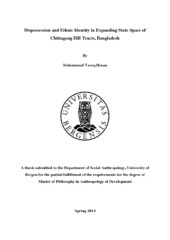| dc.description.abstract | In the milieu of the global development and state' formation of Bangladesh, the Khyang people of the Chittagong Hill Tracts (CHT) are in a situation of economic transition and marginalization. Bangladesh state's persistence to build Bangalee and Bangladeshi nation and its commitment to develop the country socio-economically (formulated and funded by the international development agencies) has led the state's encroachment of the CHT which were beyond direct state control for most of its history. During my ethnographic fieldwork in Rangamati and Bandarban of CHT, I found that with the expansion of the state space there has been a mutation of citizenship for the Khyang, where their rights and access to land and forests are being limited (and sometimes denied) through government actions and policies. Based on my ethnographic information I argue that as the state built infrastructure and as planned migration of Bangalee people took place the livelihood options for the Khyang changed from subsistence to market economy and today the Khyang are involved in diverse non-agricultural occupations. Consequently, class distinctions emerged in the social structure and, the gendered division of labor is altered (as men are taking more responsibility in household tasks and women are doing income-generating activities). Further, I have observed changes in indigenous practices of food consumption and dressing. With the changed economic frontiers forced by governmental seizure of access to land and forest the Khyang were required to change from Jhum (shifting cultivation) to plough cultivation, and became integrated in the market economy. New rights, entitlements and opportunities have opened avenues for establishing social networks with people of other ethnic groups; yet, it has also marginalized the Khyang economically and socially. While some Khyangs benefitted from these processes, the Khyang remains as a minority of the minorities' in CHT as they are denied of minority quotas in jobs and education, which are mostly availed by the larger ethnic groups like the Bangalees and Chakmas. During fieldwork, it became evident that within a shifting socio-political context Khyang identity has diversified. Engagement of the Khyang with diverse social networks has created internal differences regarding the subjective belief in their common descent as a group. I found that the idea of Khyang identity has become fluid, as for many hill populations of Southeast Asia, being subjected to state expansion and people from the valleys. Based on my ethnographic findings I argue that Khyang of different economic, political and educational backgrounds have different thoughts regarding the common history and historical consciousness of Khyang as a group is not reproduced by the younger generations. Thus, the Khyang now act as ethnic amphibians' in the CHT. | en_US |
